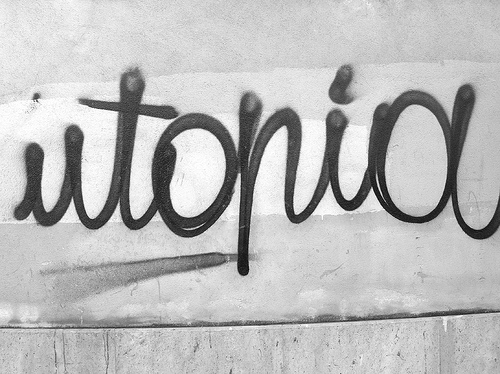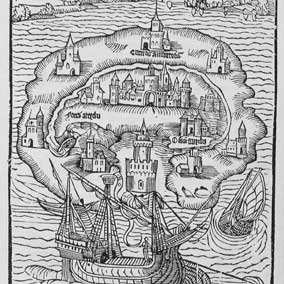|
|
|
Historical & Literary Utopias |
Utopian Literature & Communities
The
word “utopia” comes from the title of Sir Thomas More’s utopian novel /
tract of 1516,
Utopia.
The word is made up of Greek parts, formed either from
ou
(no) + topos (place, as in
“topography”) to mean “no place,” or from
eu
(good, as in “euphoria”) +
topos
(place) to mean “good place.”
In
late 20th-century popular or scholarly usage, the word “utopia”
may be used in several ways:
“Utopia” may refer to an actual or historical commune in which participants agree to particular rules or modes of behavior that distinguish them from everyday society and are designed to promote greater happiness, fulfillment, or harmony between humans and their environment. (see list of examples below) Such actual historical communes may be known as "Intentional Communities" or "Experimental Communities."
“Utopia” and especially the adjective “utopian” may describe visionary political attempts to improve or reform society. Usually such usage is negative or contemptuous. For instance, slogans associated with Hillary Clinton such as “It takes a village [to raise a child]” may be criticized by Rush Limbaugh as “utopian,” meaning “hopelessly impractical.”
A “utopia” may
also be a novel or a non-fiction book or essay describing an ideal or
planned community or the adventures of a person in one.
Famous
historical utopias in American history:
Shaker
Communities
(1800s, early 1900s); celibate lifestyle, dignity of labor, “simple gifts”;
celibacy practiced because Shakers thought they were the last generation before
the Apocalypse; thus only a few Shakers are left.
Brook
Farm
(1840s): “Transcendentalist” community outside Boston; attempted to
reconcile intellect and labor, later remodeled on principles of Fourier.
Attended by Nathaniel Hawthorne, Margaret Fuller, R. W. Emerson
Oneida
Community
(mid-1800s): "complex marriage" community in New York state;
eventually became corporation marketing Oneida silverware & stainless
Twin
Oaks
in Virginia (1960s—present), functions partly on behavioral principles
outlined in B. F. Skinner’s
Walden Two
Puritan
settlement of Boston
(1600s): often seen as utopian in purpose, as the Puritans aimed to create a
model society that Europe would observe and imitate.
Cult compounds such as the Branch Davidians in Waco, TX, the Fundamentalist Mormon Yearning for Zion compound near Eldorado, TX, or survivalist or militia compounds like those in the Pacific Northwest, Idaho, and Montana, are analogous to utopian communities, but are usually not considered utopian.
Why not? They are usually isolated and hostile to the rest of the world rather than serving as a model for the larger society; they react against social trends rather than trying to reform them; or they are seen as “charismatic cults,” centering less around ideas than around the leadership of a charismatic figure--as are many utopian groups.
Utopian
texts (fiction and nonfiction, often mixed, some with dystopian edges)
Genesis
(“Eden”); Revelation (Heaven)
Plato,
The Republic;
Laws (ca. 375
BCE)
St.
Augustine, De Civitate Dei (The City of
God) (413-426)
Sir
Thomas More, Utopia (1516)
Campanella,
The City of the Sun (1602)
Francis
Bacon, The New Atlantis (1627)
James
Harrington, The Commonwealth of Oceana
(1656)
Daniel
Defoe, Adventures of Robinson Crusoe
(1719)
Charles Fourier, Theory of the Four Movements (1808)
Etiene
Cabet, Voyage in Icaria (1840)
James
Fenimore Cooper, The Crater (1847)
Bulwer
Lytton, The Coming Race (1871)
Samuel
Butler, Erewhon (1872)
Edward
Bellamy, Looking Backward, 2000-1887
(1888)
William
Morris, News from Nowhere (1890)
William
Dean Howells, A Traveller from Altruria (1892-3);
Through the
Eye of the Needle (1907)
Frank
Baum, The Wonderful Wizard of Oz
(1900)
J.
M. Barrie, Peter Pan (1904)
H.
G. Wells, A Modern Utopia (1909);
The
World Set Free (1914)
Charlotte
Perkins Gilman,
Herland (1915)
Eugene
Zamiatin, We (1920)
James
Hilton, Lost Horizon (1933) (i. e.,
Shangri-La)
B. F. Skinner, Walden Two (1948)
John Wyndham, Consider Her Ways (1956)
Aldous
Huxley, Island (1962)
Ursula
K. LeGuin, The Dispossessed: An Ambiguous
Utopia (1974); Always Coming Home (1985)
Ernest
Callenbach, Ecotopia (1975)
Marge
Piercy, Woman on the Edge of Time
(1976)
Iain M. Banks, The Culture Series (Consider Phlebas, The Player of Games, The State of the Art, Look to Windward)
e-ducation.net list of utopian fiction
Dystopias
or satirical utopias
Jonathan
Swift, Gulliver's Travels
(1727)
Nathaniel
Hawthorne, The Blithedale Romance
(1852) (based partly on Hawthorne’s brief residence at Brook Farm in the 1840s)
Mark Twain, A Connecticut Yankee in King Arthur's Court (1889) (Time travel to medieval past)
George
Orwell, Nineteen Eighty-Four (1949)
George
Orwell, Animal Farm (1945)
William
Golding, Lord of the Flies (1954)
Aldous
Huxley, Brave New World (1932);
Brave
New World Revisited (1958)
Ayn
Rand, Anthem (1937, 1946)
Margaret
Atwood,
The Handmaid’s Tale (1985)
Margaret Atwood, Oryx and Crake (2003)
Margaret Atwood, The Year of the Flood (2009)
Suzanne Collins, The Hunger Games (2008) [Young-Adult post-apocalyptic reality TV + gladiator-survival; expanded to trilogy]
More Young Adult / Teen Dystopias

